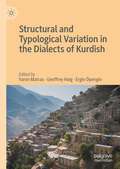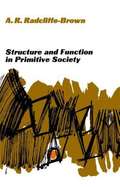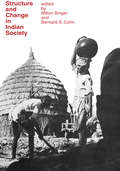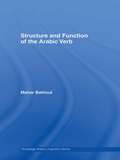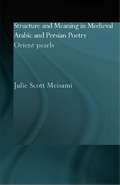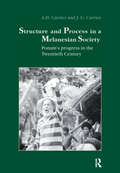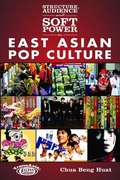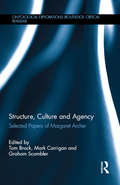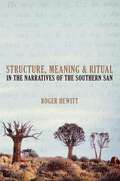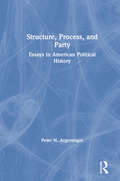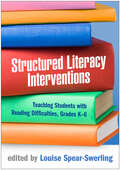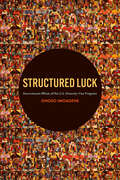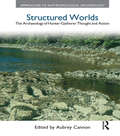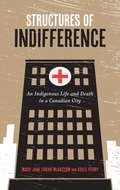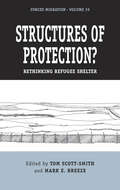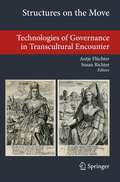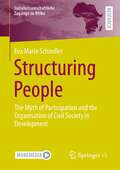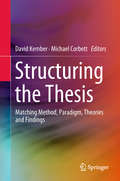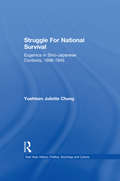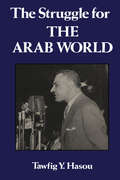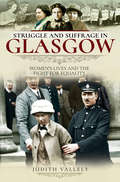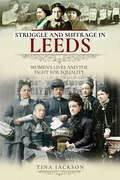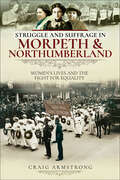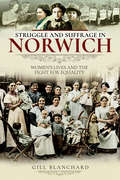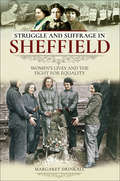- Table View
- List View
Structural and Typological Variation in the Dialects of Kurdish
by Yaron Matras Geoffrey Haig Ergin ÖpenginThis book offers the first comparative discussion of variation in selected areas of structure in the dialects of Kurdish. The contributions draw on data collected as part of the project on Structural and Typological Variation in Kurdish and stored in the Manchester Database of Kurdish Dialects online resource, as well as on additional data sources. The chapters address issues in lexicon, phonology, and morpho-syntax including nominal case, tense and aspect categories, pronominal clitics, adpositions, word order (with special reference to post-predicate constituents) and connectivity and complex clauses. The materials that inform the analysis consist of a systematic questionnaire-based elicitation covering key features of variation in lexicon and morpho-syntax, and an accompanying corpus of free speech recordings, collected in over 120 locations across the Kurdish-speaking regions in Turkey, Syria, Iraq and Iran and covering mainly the dialects of Northern and Central Kurdish (Kurmani-Bahdini and Sorani), with some consideration of Southern Kurdish. The book will be of interest to students and scholars in fields such as linguistics, linguistic typology, Iranian linguistics and linguistics of the Middle East, and dialectology.
Structure And Function In Primitive Society:Essays and Addresses
by A. R. Radcliffe-BrownThis book shows the development of the thought of a distinguished anthropologist for the last twenty-five years, and at the same time illustrate some of the more important changes in the orientation of social anthropology, with which Professor Radcliffe-Brown was so intimately associated during this period. These essays have also demonstrated their value in the training of graduate students in major centres for social anthropology.
Structure and Change in Indian Society
by Gaurav SharmaRecent theoretical and methodological innovations in the anthropological analysis of South Asian societies have introduced distinctive modifications in the study of Indian social structure and social change. This book, reporting on twenty empirical studies of Indian society conducted by outstanding scholars, reflects these trends not only with reference to Indian society itself, but also in terms of the relevance of such trends to an understanding of social change more generally.The contributors demonstrate the adaptive changes experienced by the studied groups in particular villages, towns, cities, and regions. The authors view the basic social units of joint family, caste, and village not as structural isolates, but as intimately connected with one another and with other social units through social and cultural networks of various kinds that incorporate the social units into the complex structure of Indian civilization. Within this broadened conception of social structure, these studies trace the changing relations of politics, economics, law, and language to the caste system.Showing that the caste system is dynamic, with upward and downward mobility characterizing it from pre-British times to the present, the studies suggest that the modernizing forces which entered the system since independence--parliamentary democracy, universal suffrage, land reforms, modern education, urbanization, and industrial technology--provided new opportunities and paths to upward mobility, but did not radically alter the system. The chapters in this book show that the study of Indian society reveals novel forms of social structure change. They introduce methods and theories that may well encourage social scientists to extend the study of change in Indian society to the study of change in other areas.
Structure and Function of the Arabic Verb (Routledge Arabic Linguistics Series)
by Maher BahloulStructure and Function of the Arabic Verb is a corpus-based study that unveils the morpho-syntax and the semantics of the Arabic verb. Approaches to verbal grammatical categories - the constituents of verbal systems - often rely on either semantic-pragmatic or syntactic analyses. This research bridges the gap between these two distinct approaches through a detailed analysis of Taxis, Aspect, Tense and Modality in Standard Arabic. This is accomplished by showing, firstly, some basic theoretical concerns shared by both schools of thought, and, secondly, the extent to which semantic structures and invariant meanings mirror syntactic representations. Maher Bahloul’s findings also indicate that the basic constituents of the verbal system in Arabic, namely the Perfect and the Imperfect, are systematically differentiated through their invariant semantic features in a markedness relation. Finally, this study suggests that the syntactic derivation of verbal and nominal clauses are sensitive to whether or not verbal categories are specified for their feature values, providing therefore a principled explanation to a long-standing debate. This reader friendly book will appeal to both specialists and students of Arabic linguistics, language and syntax.
Structure and Meaning in Medieval Arabic and Persian Lyric Poetry: Orient Pearls (Culture and Civilization in the Middle East)
by Julie MeisamiThis is the first comprehensive and comparative study of compositional and stylistic techniques in medieval Arabic and Persian lyric poetry. Ranging over some seven countries, it deals with works by over thirty poets in the Islamic world from Spain to present-day Afghanistan, and examines how this rich poetic traditions exhibits both continuity and development in the use of a wide variety of compositional strategies. Discussing such topics as principles of structural organisation, the use of rhetorical figures, metaphor and images, and providing detailed analyses of a large number of poetic texts, it shows how structural and semantic features interacted to bring coherence and meaning to the individual poem. It also examines works by the indigenous critics of poetry in both Arabic and Persian, and demonstrates the critics' awareness of, and interest in, the techniques which poets employed to construct poems which were both eloquent and meaningful. Comparisons are also made with classical and medieval poetics in the west. The book will be of interest not merely to specialists in the relevant fields, but also to all those interested in pre-modern poetry and poetics.
Structure and Process in a Melanesian Society: Ponam's Progress in the Twentieth Century
by A.H. Carrier J.G. CarrierFirst Published in 1991. Routledge is an imprint of Taylor & Francis, an informa company.
Structure, Audience and Soft Power in East Asian Pop Culture
by Chua Beng HuatEast Asian pop culture can be seen as an integrated cultural economy emerging from the rise of Japanese and Korean pop culture as an influential force in the distribution and reception networks of Chinese language pop culture embedded in the ethnic Chinese diaspora. Taking Singapore as a locus of pan-Asian Chineseness, Chua Beng Huat provides detailed analysis of the fragmented reception process of transcultural audiences and the processes of audiences' formation and exercise of consumer power and engagement with national politics. In an era where exercise of military power is increasingly restrained, pop culture has become an important component of soft power diplomacy and transcultural collaborations in a region that is still haunted by colonization and violence. The author notes that the aspirations behind national governments' efforts to use popular culture is limited by the fragmented nature of audiences who respond differently to the same products; by the danger of backlash from other members of the importing country's population that do not consume the popular culture products in question; and by the efforts of the primary consuming country, the People's Republic of China to shape products through co-production strategies and other indirect modes of intervention.
Structure, Culture and Agency: Selected Papers of Margaret Archer
by Mark Carrigan Graham Scambler Tom BrockProfessor Margaret Archer is a leading critical realist and major contemporary social theorist. This edited collection seeks to celebrate the scope and accomplishments of her work, distilling her theoretical and empirical contributions into four sections which capture the essence and trajectory of her research over almost four decades. Long fascinated with the problem of structure and agency, Archer’s work has constituted a decade-long engagement with this perennial issue of social thought. However, in spite of the deep interconnections that unify her body of work, it is rarely treated as a coherent whole. This is doubtless in part due to the unforgiving rigour of her arguments and prose, but also a byproduct of sociology’s ongoing compartmentalisation. This edited collection seeks to address this relative neglect by collating a selection of papers, spanning Archer’s career, which collectively elucidate both the development of her thought and the value that can be found in it as a systematic whole. This book illustrates the empirical origins of her social ontology in her early work on the sociology of education, as well as foregrounding the diverse range of influences that have conditioned her intellectual trajectory: the systems theory of Walter Buckley, the neo-Weberian analysis of Lockwood, the critical realist philosophy of Roy Bhaskar and, more recently, her engagement with American pragmatism and the Italian school of relational sociology. What emerges is a series of important contributions to our understanding of the relationship between structure, culture and agency. Acting to introduce and guide readers through these contributions, this book carries the potential to inform exciting and innovative sociological research.
Structure, Meaning and Ritual in the Narratives of the Southern San
by Roger HewittAnalyses texts drawn from the Bleek and Lloyd Archive, arguably one of the most important collections for the understanding of South African cultural heritage and in particular the traditions of the /Xam, South Africas first people. Initially appearing in a now rare 1986 edition and here re-issued for the first time, the doctoral thesis on which the book is based became the catalyst for much scholarly research. The book offers an analysis of the entire corpus of /Xam narratives found in the Bleek and Lloyd collection, focusing particularly on the cycle of narratives concerning the trickster /Kaggen (Mantis). These are examined on three levels from the 'deep structures' with resonances in other areas of /Xam culture and supernatural belief, through the recurring patterns of narrative composition apparent across the cycle and finally touching on the observable differences in the performances by the various /Xam collaborators.Hewitt's text remains the only comprehensive and detailed study of /Xam narrative, and it has become itself the object of study by researchers and PhD candidates in South Africa, the United Kingdom, Canada and elsewhere. This new edition at last makes Hewitt's important work more widely available. It will be a welcome addition to the recently burgeoning literature on the place of the /Xam hunter-gatherers in the complex history of South African culture and society.
Structure, Process and Party: Essays in American Political History
by Peter H. ArgersingerChallenging traditional approaches to the study of American political history, the essays in this book establish the significance of the institutional framework of the electoral system and argue the importance of its interaction with political conditions.
Structured Literacy Interventions: Teaching Students with Reading Difficulties, Grades K-6 (The Guilford Series on Intensive Instruction)
by Louise Spear-SwerlingComprehensive and evidence-based, Structured Literacy (SL) approaches place a high value on explicit, systematic, and sequential instruction. This book brings together leading experts to present a wealth of SL interventions for different components of literacy. Chapters describe instructional strategies for supporting phonological awareness, basic and multisyllabic word decoding, spelling, reading fluency, vocabulary, oral and reading comprehension, and written expression, especially for at-risk readers and those with disabilities. Including case studies, sample intervention activities, lesson plans, and end-of-chapter application activities, the book contains reproducible tools that can be downloaded and printed in a convenient 8½&“ x 11&” size. An NCTQ Exemplary Text for Reading Instruction See also Louise Spear-Swerling's authored volume, The Structured Literacy Planner: Designing Interventions for Common Reading Difficulties, Grades 1–9, which provides blueprints for tailoring interventions based on a learner's reading profile.
Structured Luck: Downstream Effects of the U.S. Diversity Visa Program
by Onoso ImoageneThe Diversity Immigrant Visa Program is a lottery that awards winners from underrepresented countries the chance to apply for legal permanent residence in the United States. Most lottery winners think of themselves as lucky, viewing the win as an opportunity to pursue better lives for themselves and their families. In Structured Luck, sociologist Onoso Imoagene uses immigrants’ stories to show that while the visa program benefits many recipients, the program’s design can also lead to exploitation in their countries of origin and reduced potential once they are in the United States. Combining ethnographic observation in Africa and interviews with immigrants, their family members, and friends from Ghana and Nigeria, Imoagene demonstrates that the visa program is a process of “structured luck,” from how people hear about the lottery, who registers for it, and who participates in it to the application requirements for the visa. In Ghana and Nigeria, people often learn about the lottery through friends, colleagues, or relatives who persuade them to enter for the perceived benefits of receiving a visa: opportunities for upward mobility, permanent legal status, and the ability to bring along family members. Though anyone can enter the lottery, not everyone who wins obtains a visa. The visa application process requires proof of a high school diploma or artisan skills, a medical exam, a criminal background check, an interview with U.S. consular officers, and payment of fees. Such requirements have led to the growth of visa entrepreneurs, who often charge exorbitant fees to steer immigrants through the process. Visa recipients who were on track to obtain university degrees at home often leave in the middle of their studies for the United States but struggle to continue their education due to high U.S. tuition costs. And though their legal status allows them to escape the demoralizing situations that face the undocumented, these immigrants lack the social support that the government sometimes provides for refugees and other migrants. Ultimately, Imoagene notes, the real winner of the visa lottery is not the immigrants themselves but the United States, which benefits from their relatively higher levels of education. Consequently, she argues, the U.S. must do more to minimize the visa program’s negative consequences. Structured Luck illuminates the trauma, resilience, and determination of immigrants who come to the United States through the Diversity Visa Program and calls for the United States to develop policies that will better integrate them into society.
Structured Worlds: The Archaeology of Hunter-Gatherer Thought and Action
by Aubrey CannonHunter-gatherer societies are constrained by their environment and the technologies available to them. However, until now the role of culture in foraging communities has not been widely considered. 'Structured Worlds' examines the role of cosmology, values, and perceptions in the archaeological histories of hunter-fisher-gatherers. The essays examine a range of cultures - Mesolithic Europe, Siberia, Jomon Japan, the Northwest Coast, the northern Plains, and High Arctic of North America - to show the role of conceptual frameworks in subsistence and settlement, technology, mobility, migration, demography, and social organization. Spanning from the early Holocene period to the present day, 'Structured Worlds' draws on archaeology and ethnography to explore the role of beliefs, ritual, and social values in the interaction between foragers and their physical and social landscape. Material culture, animal bones and settlement patterns show that the behaviours of hunter-gatherers were shaped as much by cultural concepts as by material need.
Structures of Indifference: An Indigenous Life and Death in a Canadian City
by Adele Perry Mary Jane McCallumStructures of Indifference examines an Indigenous life and death in a Canadian city, and what it reveals about the ongoing history of colonialism. At the heart of this story is a thirty-four-hour period in September 2008. During that day and half, Brian Sinclair, a middle-aged, non-Status Anishinaabeg resident of Manitoba's capital city, arrived in the emergency room of the Health Sciences Centre, Winnipeg's major downtown hospital, was left untreated and unattended to, and ultimately died from an easily treatable infection. His death reflects a particular structure of indifference born of and maintained by colonialism. McCallum and Perry present the ways in which Sinclair, once erased and ignored, came to represent diffuse, yet singular and largely dehumanized ideas about Indigenous people, modernity, and decline in cities. This story tells us about ordinary indigeneity in the City of Winnipeg through Sinclair's experience and restores the complex humanity denied him in his interactions with Canadian health and legal systems, both before and after his death. Structures of Indifference completes the story left untold by the inquiry into Sinclair's death, the 2014 report of which omitted any consideration of underlying factors, including racism and systemic discrimination.
Structures of Protection?: Rethinking Refugee Shelter (Forced Migration #39)
by Tom Scott-Smith Mark E. BreezeQuestioning what shelter is and how we can define it, this volume brings together essays on different forms of refugee shelter, with a view to widening public understanding about the lives of forced migrants and developing theoretical understanding of this oft-neglected facet of the refugee experience. Drawing on a range of disciplines, including sociology, anthropology, law, architecture, and history, each of the chapters describes a particular shelter and uses this to open up theoretical reflections on the relationship between architecture, place, politics, design and displacement.
Structures on the Move
by Antje Flüchter Susan RichterThis book enters new territory by moving toward a new conceptual framework for comparative and interdisciplinary research on transcultural state formation. Once more, statehood and governance are highly discussed topics, whereby modern state building is often considered to be a genuinely European characteristic, despite the fact that early modern Europeans knew of, experienced and grappled with highly developed states in Asia. The articles collected in this book discuss how strategies of governance were part of transcultural transfers between the two continents. The first part presents and discusses concepts of statehood in order to provide a set of conceptual tools for analyzing the transcultural appropriation of governmental strategies. The second part is concerned with case studies that examine the transcultural perception of governance, and the third and final part gathers perspectives on political practice in transcultural encounters (e.g. military, administration, and diplomacy)
Structuring People: The Myth of Participation and the Organisation of Civil Society in Development (Sozialwissenschaftliche Zugänge zu Afrika)
by Eva Marie SchindlerParticipation has become an orthodoxy in the field of development, an essential element of projects and programmes. This book analyses participation in development interventions as an institutionalised expectation – a rationalized myth – and examines how organisations on different levels of government process it. At least two different objectives of participation are appropriate and legitimate for international organisations in the field: the empowerment of local beneficiaries and the achievement of programme goals. Both integrate participatory forums into the organisational logic of development interventions. Local administrations react to the institutionalised expectation with means-ends decoupling, where participatory forums are implemented superficially but de facto remain marginalised in local administrative processes and activities. The book furthermore provides a thick description of the organisationality of participation in development interventions. Participatory forums are shown to be a form of partial organisation. They establish an order in the relationship between administrations and citizens through the introduction of rules and the creation of a defined membership. At the same time, this order is found to be fragile and subject to criticism and negotiation.
Structuring the Thesis: Matching Method, Paradigm, Theories and Findings
by Michael Corbett David KemberThe book is a collective investigation of the structuring of theses in education, the social sciences and other disciplines that commonly do not follow the standard procedures of the scientific method. To help research students design a structure for their own thesis and liberate their investigations from the constraints associated with the use of the conventional structure, it explains how the structures adopted were designed to suit the topic, methodology and paradigm. It also provides a wide range of examples to draw upon, which suit a broad spectrum of theory, methodological approaches, research methods and paradigms. Additionally, by analyzing the methodologies and paradigms, and reviewing the methodological and paradigmatic spectrum, it offers a significant contribution to the way research is conceptualized.The book addresses a number of key questions faced by students, supervisors and examiners: •Why do examiners often find it difficult to read work in non-scientific disciplines when theses are structured in accordance with the conventional scientific method?•Why do students in non-scientific disciplines struggle to write up the outcomes of their research in the conventional structure?•What alternative thesis structures can be devised to better suit the wide range of methods?•Which theories and paradigms are commonly followed in education and the social sciences and how do these perspectives influence the research process? •What methods, theories and paradigms are commonly adopted by education and social science students and what problems do these pose when students write their theses?
Struggle For National Survival: Chinese Eugenics in a Transnational Context, 1896-1945 (East Asia: History, Politics, Sociology and Culture)
by Yuehtsen Juliette ChungThis dissertation is a historical investigation of the relationship between science and society through the comparative study of eugenics movements as they developed in both Japan and China from the 1890's to the 1940's.
Struggle For The Arab World
by Tawfig Y. HasouInternational regional organizations are created to serve the interests of the member states. The Arab League, the second oldest continuously existing regional organization of its kind (only the Organization of American States has a longer history), was established in 1945 to serve, in the view of the founding fathers, the interests and aspirations of the Arab people. The main objective of this study is to show that regional organizations are often used by the major regional powers to advance their foreign policy goals, as the case of Egypt in the League of Arab States during the tenure of President Gamal Abdel-Nasser clearly shows. First published in 1985. Routledge is an imprint of Taylor & Francis, an informa company.
Struggle and Suffrage in Glasgow: Women's Lives and the Fight for Equality (Struggle And Suffrage Ser.)
by Judith VallelyOn a dark January night in 1914, Glasgow&’s iconic Kibble Palace at the Botanic Gardens became the target of a bomb attack which shattered 27 large panes of glass. The police concluded it was the work of militant suffragettes after discovering footprints of ladies&’ shoes…and an empty champagne bottle and cake. The attack was just one of many incidents as the women of Glasgow battled for the right to vote: marching on the streets, daring escapes from under the nose of police officers, and a meeting which ended in a riot. One hundred years from when some women were finally able to go to the ballot box for the first time, this book examines the inspirational women of Glasgow of the time and their quest for equal rights and improvements in all areas of society. The women who challenged miserable conditions facing workers, who fought for a formal university education and helped to improve the health of the nation. The women who took part in the suffrage movement in Glasgow, from the first meetings to militant action and force feeding. The women who took on work from driving trams to staffing hospitals on the frontline when war broke out. And the journey from women gaining the right to vote to being able to take a seat in Parliament for the first time. Struggle and Suffrage in Glasgow uncovers stories of the pioneering women of the city who left a legacy for generations to come.
Struggle and Suffrage in Leeds: Women's Lives and the Fight for Equality (Struggle And Suffrage Ser.)
by Tina JacksonThe story of Leeds is bound up in the stories of its women workers. But what were conditions like for ordinary women, and how did their lives change in the hundred years between 1850 and 1950? Who were the women who toiled in the mills, factories and sweatshops that transformed the city’s landscape? Where and how did they live? What did they do in their leisure time? What happened to them when they needed medical care? What did the campaign for suffrage mean in real-life terms for the women who had no vote and whose voices have rarely been heard? In Leeds, the campaign for suffrage was set against a backdrop of industry that relied on women workers for whom hardship was a fact of life. As the campaign for votes for women gained traction from the 1860s, social and political reformers and activists worked to improve conditions not just in industry, but in schools, hospitals and in the opportunities available to women and girls. Some of the women, like the prominent suffragette Leonora Cohen and Leeds’ first female MP, Alice Bacon, are still talked about, but the city’s history is full of the stories of exceptional, inspirational women who in their own ways did their bit, broke the mould, and refused to fit into proscribed roles. In doing so, they opened the door for women to achieve some of the freedoms we now take for granted. This new, fully illustrated book brings them back from obscurity and lets their voices to heard.
Struggle and Suffrage in Morpeth & Northumberland: Women's Lives and the Fight for Equality (Struggle And Suffrage Ser.)
by Craig ArmstrongA portrait of the battle for voting rights in a rural English county, and the dramatic life and death of one fierce suffragette.For much of the nineteenth century, the women of Northumberland occupied crucial, though largely underappreciated, roles in society. Aside from the hard life of raising families in an area where money was often hard to come by and much of the available work was labor-intensive and dangerous, women were also expected to help bring money into the household.In what was a largely agrarian county, female laborers, known as bondagers, were widely respected for their contribution to the local economy, though there were those who criticized the system for forcing women to undertake hard manual labor. The farming economy in Northumberland depended so much on female labor that many men found it easier to be taken on by an employer if they were able to bring a suitable female worker with them.The period was also one of considerable upheaval. There were a number of prominent Northumbrian suffragists, and the local radical suffragettes launched attacks in the area. Morpeth was a very early supporter of women’s suffrage and the mayor and local council actively supported the cause, though they remained largely opposed to the actions of the suffragettes. Among other topics, this book follows the story of London-born Emily Wilding Davison, whose mother was Northumbrian and had a wide network of relations in the county. After her father’s death, her mother relocated to the Northumberland village of Longhorsley and Emily spent long periods with her, recuperating after her numerous hunger strikes. Famously losing her life after being struck by the king’s horse at the 1913 Epsom Derby, Emily was buried with great ceremony in a quiet churchyard and to this day remains one of Morpeth’s most famous (adopted) daughters, her grave a site of pilgrimage for supporters of women’s rights.
Struggle and Suffrage in Norwich: Women's Lives and the Fight for Equality
by Gill BlanchardA local historian explores the lives of women—both ordinary and extraordinary—who fought for change in Norwich, England, from 1850–1950.Norwich has been home to notable women, such as Mabel Clarkson, the first female sheriff in England who went on to serve as Lord Mayor of Norwich in the 1930s. But the history of Norwich has also been shaped by many other women whose stories too often remain in the shadows. In Struggle and Suffrage in Norwich, local historian Gill Blanchard sheds light on the lives of Norwich women who fought poverty, campaigned for voting rights, and had a lasting impact on their city. Blanchard tells the stories of divorcee Elizabeth Gurney; suffragette Miriam Pratt; nurse Philippa Flowerday, blacksmith Elizabeth Sabberton; economist and writer Harriet Martineau; abolitionist and writer Amelia Opie; Dorothy Jewson, the first female MP in Norwich and East Anglia; and numerous schoolteachers, clerks, tradeswomen, weavers, WWI munitionettes, and more.
Struggle and Suffrage in Sheffield: Women's Lives and the Fight for Equality (Struggle And Suffrage Ser.)
by Margaret DrinkallA history of the women’s movement in Sheffield, England in the twentieth century, examining how women’s roles evolved during and between the world wars.This book looks into the role of women of Sheffield and how it has evolved from the powerlessness of a woman involved in a wife sale, to the achievement of the election of its first female Lord Mayor. Using newspapers of the period, archive material and modern photographs, Struggle and Suffrage in Sheffield examines how the role of women slowly changed in the city. It also highlights the militancy of the Sheffield suffragettes who not only organised demonstrations in Sheffield, but also sent groups to take part in some of the most notorious demonstrations in London. Following these demonstrations several local women were badly manhandled by police before being arrested and sent to Holloway Prison. Adela Pankhurst tried at first to bring the women of the Sheffield WSPU to achieve the vote through peaceful means, only when the Conciliation Bill of June 1910 was dropped, did she then encourage them to take more militant action. Following the outbreak of both world wars the women of Sheffield worked in the steelworks making munitions. They worked day and night shifts as bombs were falling about them, but when both wars ended they were abruptly dismissed, as the men returned to take up their former jobs. Only following a meeting with PM Gordon Brown and the erection of a bronze statue of Women of Steel in 2016, did Sheffield women truly get the acknowledgment they deserved.
